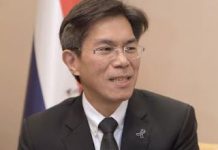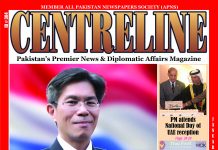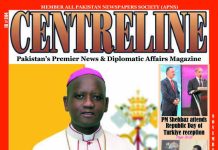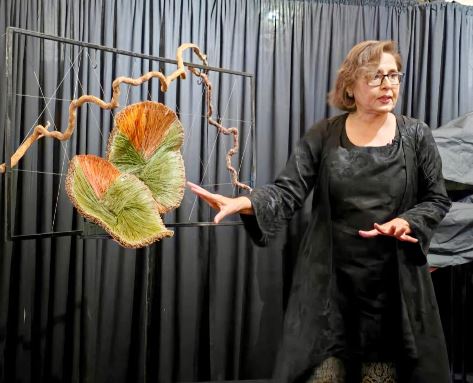Ambassador of Republic of Korea Talks to DNA and Centreline
Ansar Mahmood Bbhatti
Ambassador of Republic of Korea Mr. Song Jong-hwan gave an exclusive interview to Diplomatic News Agency (DNA) and Centreline. He talked about a variety of issues ranging from bilateral relations to regional matters. Ambassador Song Jong-hwan is a career diplomat and has precise grip over regional as well as global issues. He is extremely keen to see South Korea, Pakistan relations growing at a fast speed. He talked about a number of projects, especially in the field of energy, which after completion, would ease out Pakistan’s energy related issues. Here is the text of the interview.
Excellency, it is a pleasure to have you with us, thank you for joining us. What message will you give for the Pakistani people on the occasion of Korea Month?
Actually, Korean National Day is on October 03. However, to make the National Day celebrations more vigorous, this year the embassy has labeled the month of October as Korea Month. Thus we are organizing a series of events in all walks of life, including National Day Reception on Oct 15.
I hope these events will provide a wonderful opportunity to cementing the friendly and cooperative relations between our two countries further, enlarging the people to people contacts and elaborating the Korean history and culture at ramp and through television to people of Pakistan. I expect an active attendance on all these events by local community.
You once remarked that Pakistan and Korea share an interesting history. Can you please elaborate this.
Diplomatic relations between our countries were established in 1983. However, the relations between our people date back to the fourth century when Maranantha, a famous Buddhist monk, studied Buddhism in Taxila and then introduced Buddhism to Korea. He hailed from Chota Lahore in Swabi district of Khyber-Pakhtunkhwa. Another famous Korean monk, Heycho, visited this area in the 8th century. He wrote a travelogue named “Memoirs of the Pilgrimage to the Five Kingdoms of the Subcontinent” which includes present day Kashmir, Gilgit and Peshawar.
During the Korean War from 1950 to 1953 Pakistan provided humanitarian assistance to the Republic of Korea. So our association is historical and provides solid grounds to build a strong and durable friendship for the future.
In your recently published article you mentioned a miracle on the River Han. Please tell us more about this.
Thanks to the visionary leaders and the hard work of the Korean people, Korea today is a major economic power in the world. Korean per capita income in 1960 was less than $80. Now Korean per capita income is more than twenty-eight thousand dollars! Korea’s trade volume has been more than a trillion dollars since 2010. This is called the ‘Miracle of the Han River’.
It is my wish to see a similar ‘Miracle of the Indus River’ in Pakistan. God has given Pakistan the second highest mountain in the world as well as a deep sea like the Indian Ocean. Pakistan has a strategic location, abundant natural resources, population and land and more importantly it also has talented and skilled labor. All these reasons convince me Pakistan can achieve its own Miracle of the Indus River.
Can you share with our readers the Korean projects being undertaken in Pakistan and the assistance being provided?
The building of Islamabad-Lahore Motorway (M-2) by Daewoo Korea in 1990s is a landmark project. It has transformed Pakistan’s road transport system by providing modern transport services. Lowari tunnel, expansion of Karachi port, Hydro Power plants and the construction of a university in AJK are few other projects being undertaken by renowned Korean companies.
Korea is actively supporting Pakistan in its socio-economic development projects by extending financial assistance worth millions of dollars through Economic Development Cooperation Fund (EDCF) including 78 million dollars EDCF financing pledged for Malakand tunnel project in 2011, over 45 million dollars extended to develop seven grid stations in Gujranwala in 2007 and about 27.5 million dollars were provided to develop a grid station in Lahore.
A framework arrangement to provide 500 million dollars EDCF financing for the period 2015 to 2017 is going to be signed soon at government to government level. Under that about 12 candidate projects in the areas of IT parks, power transmission system, road and tunnel infrastructure development, health, water and agriculture have already been short-listed. Children Hospital Establishment project and Financing for N45 Section III (Kalkatak to Chitral) has already been approved and financing for the Section I (Chakdra to Timergara) is under discussion, while, Islamabad IT Park project feasibility study has also been initiated by Korean experts.
KOICA is providing grant aid and technical cooperation programs worth 10million US dollars annually. The grant aid includes several developmental projects in Water, Health and Sanitation, Education, Agriculture, Rural Development, ICT and Textile to build human capacities and provide employment opportunities to the communities particularly youth and women. Likewise, every year, more than hundred officials are trained in Korea by sharing Korea’s unique and advance expertise through technical cooperation program. So far more than one thousand Pakistani government officials have benefited from this program and have a very active Alumni association at national and provincial levels. KOICA Alumni Association Pakistan is greatly contributing in building strong ties between Korean and Pakistani nation. Besides these projects, we had been supporting rehabilitation and emergency relief programs during natural and human disasters as humanitarian aid. The Korean government will continue its bilateral support to Pakistan and improve its economic condition and social development in future.
How would you describe bilateral relations especially in the field of trade and economy?
Korea and Pakistan are leading trade partners, however, for last two years this trade partnership after touching the two-way trade volume at 1.6 billion dollars in 2012 has dropped to 1.17 billion dollars in 2014, which implies a 27% decline in just two years.
To reverse this trend and to boost the business partnership further, various sincere efforts are underway like; during the visit of Prime Minister of Korea to Islamabad in mid-April 2014, Korea and Pakistan signed an MoU on “Trade And Investment Cooperation” and agreed to explore the possibilities of a free trade agreement between the two countries.
As a follow-up of that Premiers levels commitments, Federal Minister for Commerce of Pakistan Mr. Khurram Dastgir Khan visited Korea in July 2015 on his Korean counterpart’s invitation. The visit highlights were a Joint Committee on Trade & Investment meeting, an agreement to start a joint feasibility study on FTA was inked between Korea Institute for International Economic Policy (KIEP) and Pakistan Institute of Trade and Development (PITAD), the respective economic research institutes of Korea and Pakistan, and the visiting delegates held meetings with trade related Korean agencies; KEXIM, KOTRA, KCCI, KOIMA and leading conglomerates including Lotte Group, Hyundai Motors, Korean Air, K-insurance etc for exploring the mutually beneficial opportunities.
At the Embassy level, we are organizing various business forums, and visiting major Chambers of Commerce & Industries of Pakistan regularly to promote the trade relations. I have written many articles, in Pakistan and Korea, to create awareness about the good aspects and the potential of Pakistan.
How do you view the business potential that Pakistan markets offer for foreign investors and how can we further improve our business environment?
Business plays a very important and positive role for the progress and prosperity of any country. Pakistan is amongst the important emerging economies of the region, with about a 190 million population, presenting an ideal location for access to all the growing markets of the world, with liberal and investor friendly policies. The Government of Pakistan welcomes foreign investment and offers incentives to attract new capital inflows, including tax exemptions, reduced tariffs, and infrastructure and investor facilitation services.
I have a firm belief that the potential and the opportunities for the economic cooperation between our two supplementary natures of economies are much higher as compared to our current trade and investment levels. If Pakistan’s abundant natural and human resources are combined with Korea’s advanced technologies and capital investment, they can bring substantial benefits in the economic development of both nations.
Agriculture is another area, where Korea and Pakistan have initiated exploring the possibility of mutual cooperation. Pakistan is rich in agro-land, irrigation system and relevant human resource, while Korea is renowned for its agro-technology and expertise. In that way, a joint working in the agriculture sector certainly can bring food security and economic prosperity for our two countries.
Can you introduce about some of the Korean companies doing business in Pakistan? What operational difficulties are they experiencing?
Korean companies such as Lotte, Daewoo and Hyundai (Engineering), Samsung and LG Electronics have established a reputation as excellent business partners and manufacturer of quality consumer goods.Samsung, LG, are household retail names in Pakistan. Lotte group is the single largest foreign direct investor to date in the petrochemical and confectionery industry of the country. POSCO engineering is investing in the steel sector of Pakistan. These two companies are facing business issues here due to lack of implementation on some commitments made by the previous governments. I hope the present business friendly government of Prime Minister Nawaz Sharif will resolve Lotte& POSCO issues soon.
Korea is one of the leading hydropower development partners of Pakistan by undertaking a number of hydropower projects (HPPs) amounted billions of dollars such as;
– 84 mw New Bong HPP has been constructed by Sambu construction in 2013.
– 147 mw Patrind HPP by K-water, 100 mw Gulpur HPP by KOSEP and 106 mw GolenGol HPP by Sambu construction are being constructed on fast track basis.
In addition to this, the review studies of over 1,000 mw HPPs are at an advance stage of its initiation.
Korea has been accepting manpower from Pakistan. Please tell us whether this practice still continuing? And how can this manpower contribute to cementing of relations between the two countries?
Pakistani manpower is going to the Republic of Korea through EPS since 2008 in small and medium enterprises of the manufacturing and fisheries industry.
There are about 5000 un-skilled/semi-skilled Pakistani workers are working in Korea under employment permit system on E-9 Visa and contributing in Korean development and economy. The average salary of a worker is 1,200 US dollars which is equal to around Rs. 120,000.Therefore, yearly remittances from Korea to Pakistan are about Rs. 4-5 billion as well.
The Ministry of Employment and Labour of the Republic of Korea and Ministry of Overseas Pakistani and Human Resources Development of Islamic Republic of Pakistan have recently renewal MOU for another two years for providing employment opportunities to Pakistani manpower in Korea.
What is your opinion about cultural relations and tourism ?
I believe that cultural links are important. Many Pakistanis are learning Korean language at the Sejong Institute at NUML and at other private institutes. Hundreds of Pakistani officials and students come to Korea every year for training and education while thousands of Pakistani workers are contributing to the Korean economy. Koreans also love to visit Pakistan, especially Taxila and Hunza.
As part of endeavours to strengthen bilateral relations, in 2014 the Embassy set a “Korea Week” and hosted various events like Seminar on Korea-Pakistan relations, Nanta performance, Meeting on business activity support and cooperation, National day reception, and Goreyah concert etc. This year, we have set a “Korea Month” during which more diverse events will be held in Islamabad and Lahore. For example, signing ceremony of EDCF Framework Agreement, Korea-Pakistan Ancient Cultural Exchange seminar, Hangul Proclamation day event, Gala Dinner show of Hanbok Fashion, meeting on business activity support and cooperation, ground-breaking ceremony for Gulpur Hydro power plant, National Day reception, KOICA Alumni reunion, seminar on Knowledge Sharing of Korean Economic Development and Cohesion, and ‘Dea Jang-Geum’ (Jewel in the palace) broadcasting, etc. If we enhance the media coverage of each other’s countries, it will create greater awareness and will further strengthen ties in the fields of culture and tourism.
What are your concluding remarks for our readers?
As Pakistan is rich in natural and human resources, while, Korea has a lot of know-how of economic development, so, a joint venture between our two nations would be mutually very beneficial.











